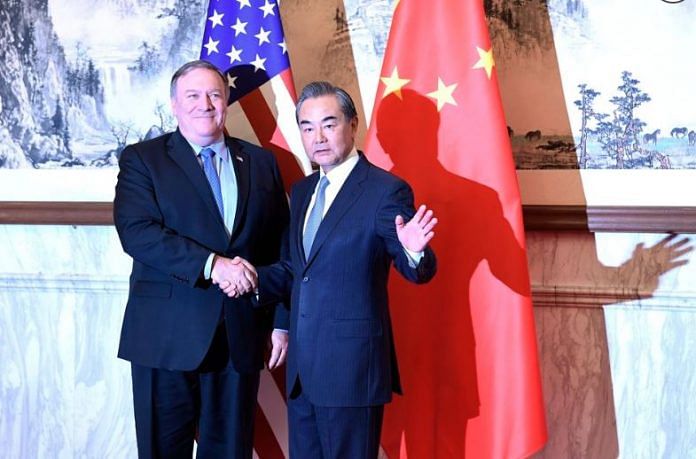Secretary of State Pompeo flew to Asia and found himself facing the limits of Trump’s efforts to woo Kim Jong Un while confronting China.
New Delhi: Secretary of State Michael Pompeo flew to Asia to shore up a weakening sanctions regime on North Korea, nail down a date for a future summit between Donald Trump and Kim Jong Un and assuage Chinese officials days after Vice President Mike Pence lambasted their country.
Things didn’t go as planned.
Instead, Pompeo found himself facing the limits of his boss’s efforts to woo Kim while confronting China. First, he was forced to negotiate on the tarmac in Pyongyang over who could attend his meetings with Kim. Later, he received a public rebuke in Beijing from the China’s foreign minister. He flew back to the U.S. with little new to show for three days of lightning diplomacy.
The trip illustrates the administration’s struggle to counter challenges to American influence in Asia as the president focuses on turbulent domestic politics ahead of a pivotal midterm election. While Trump is seeking a second meeting with Kim — possibly ahead of the Nov. 6 voting — he’s sending Pence in his place to regional summits planned for next month in Singapore and Papua New Guinea.
Pompeo’s hurdles were highest in Pyongyang. While the two sides had kind words for each other — Kim was reported to find the visit “wonderful” — Pompeo came away without a date for another Trump-Kim meeting or any news on when key milestones in denuclearization might take place.
Slow Progress
“Four months after the U.S.-North Korean summit and we still don’t even have a common definition of seemingly straightforward terms such as ‘denuclearization’ and ‘Korean Peninsula,’” Bruce Klingner, senior research fellow for Northeast Asia at the Heritage Foundation in Washington, said via email.
Pompeo, however, told a reporter traveling with him Monday that “we made significant progress. We’ll continue to make significant progress, and we are further along in making that progress than any administration in an awfully long time.”
He cited Kim’s invitation to have inspectors visit the already dismantled Punggye-ri test facility, the site of all six of the regime’s nuclear blasts. But when asked when inspectors might arrive, Pompeo offered few specifics.
“As soon as we get it logistically worked out, Chairman Kim said he’s ready” to “allow them to come in,” and once the arrangements are made “we’ll put them on the ground,” Pompeo said.
China Rebuke
Things didn’t go much better a day later in Beijing, where Pompeo had the bad fortune of being the first senior U.S. official to visit the country since a blistering speech on China last week from Pence. China is a bigger threat than Russia, Pence said Thursday, and is actively “meddling in America’s democracy.”
In an unusually public rebuke, Chinese Foreign Minister Wang Yi accused the U.S. of undermining mutual trust between the countries as Pompeo sat across from him. The secretary of state began his response talking about “fundamental disagreement” on key issues between the world’s two biggest economies, but signaling optimism that “candid” conversations would bring both sides together.
Those disagreements — a burgeoning trade war, China’s territorial claims in the South China Sea and U.S. policy toward Taiwan — are unlikely to be resolved any time soon. Moreover, Chinese officials signaled the discord undermines efforts to cooperate on North Korea, making the U.S. bid to disarm Kim’s regime even less likely.

Territorial Disputes
State Department spokeswoman Heather Nauert said Pompeo “directly addressed areas where the United States and China do not agree, including on the South China Sea and human rights. He also emphasized the importance of maintaining cross-strait peace and stability.”
Tensions are rising: U.S. and Chinese destroyers had a near-miss in the South China Sea recently near Gaven Reef, part of the disputed Spratly archipelago where China has developed military outposts. Last month, China refused a U.S. warship entry to Hong Kong, days after Washington sanctioned the Chinese military for buying Russian weapons.
The bruised relationship could face additional strain as the Trump administration weighs whether to name China a currency manipulator in a report due out next week. Treasury Secretary Steven Mnuchin has faced pressure from the White House to formally brand Beijing with the designation as the yuan weakens, crossing the key 6.9 yuan per dollar level.
Taiwan Tensions
Wang, the foreign minister, made clear that China was most concerned about recent U.S. moves to improve ties with the democratically run island of Taiwan, which Beijing considers a province. The State Department last month approved the proposed sale of $330 million of spare parts and other military equipment to Taiwan.
Wang called on the U.S. to cease military contacts and further arms sales to Taiwan and stop interfering with Chinese efforts to establish diplomatic relations with the island’s existing diplomatic partners.
For a U.S. president who likes to use leader-to-leader diplomacy to help resolve issues, it’s not clear when Trump will get that opportunity. He’s skipping two annual gatherings of world leaders in Asia next month. But he and Xi could meet on the sidelines of the G-20 meeting in Buenos Aires later in November.
That makes any focus on a second Trump-Kim summit misguided, Klingner of Heritage said. “An announcement of a near-term summit would show that the Trump administration has again prioritized a flashy show over real substance,” he said.

As part of his delegation to Pyongyang, Pompeo brought along Stephen Biegun, his special representative to North Korea and the diplomat expected to take on more of the day-to-day negotiating with Kim’s regime.
But Biegun never got to meet his likely North Korean counterpart, Vice Minister for Foreign Affairs Choe Son Hui. Choe was out of the country when the Americans arrived — meeting officials from China and Russia.
— With assistance by Nick Wadhams
-Bloomberg wire



